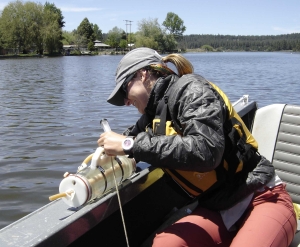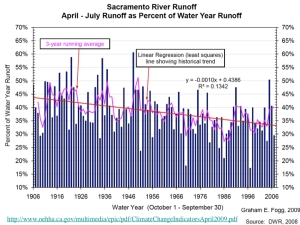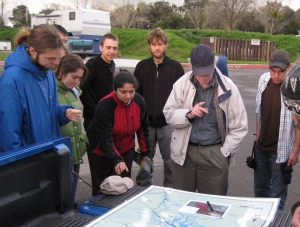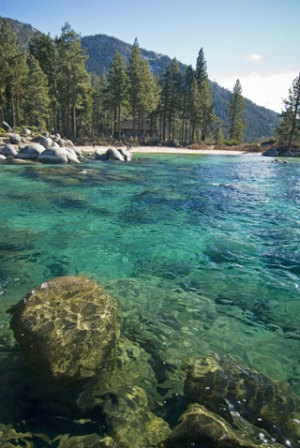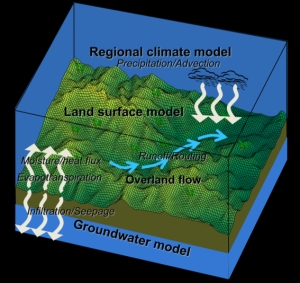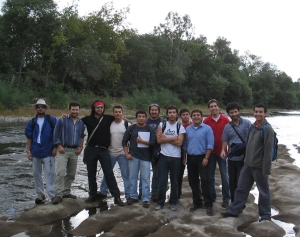Research in Climate Change, Water, and Society
Research in the CCWAS IGERT lies within four primary areas of focus:
- the interface between general circulation models and regional climate model
- the climate-hydrology interface
- water availability and adapative watershed management; and
- decision-making under uncertainty.
The CCWAS IGERT emphasizes fostering these areas of study, with concomitant interaction between modelers, forecasting agencies, and users. In addition, integration between areas will be achieved via computation and informatics, and via exchanges with Chilean scientists.
|
Graduate student Allison Oliver sampling on the Klamath River. Photo courtesy of Allison Oliver.
|
The interface between general circulation models and regional climate models
| Over the past 30 years, general circulation models (GCMs) have provided long-term forecasts at the global scale. However, understanding the future effects of climate change on water resources at the regional or sub-continental scale requires the development of regional climate models (RCMs) linked to regional hydrologic models. To downscale to the regional level, current GCMs require incorporating increased uncertainty, hydrological feedbacks, and phenomena such as extreme climate events (such as droughts) or the impact of regional climate change on the frequency and severity of weather events. |
Ten-year trend in runoff. Click to open a larger version of the runoff_trends image. Courtesy of Graham Fogg.
|
The climate-hydrology interface
This is a particularly exciting time for climate and hydrologic scientists as the combination of computational means and scientific understanding make possible the first ever unified hydroclimate models, which will ultimately produce better climate and water resources analyses. Trainees in the CCWAS IGERT will be prepared to examine regional hydrologic response to climate change under uncertainty using hydrologic models that incorporate surface and subsurface processes, Monte Carlo simulation, and coupling between landscape-level processes and climate models from the soil and leaf level to the global scale.
Water availability and adapative watershed management
| Adaptive management has been forwarded by a variety of scholars as a mechanism for responding to uncertainty through policy learning. Policy learning can occur through active experimentation with different management practices or by passively learning from the results of previous decisions on topics that include water use efficiency or water conservation, market and non-market reallocations of water, investments in storage infrastructure, water conveyance, water reuse, desalination, and improvements in system operations. Current adaptation efforts are already underway, however, most planning and climate change preparation is not being implemented with much systematic analytical integration. CCWAS trainees will have opportunities to link existing engineering-economic models with process-oriented hydro-climatological models to improve local and regional water management. |
Trainer Jay Lund on a field trip. Photo: Peter Moyle/UC Davis.
|
Decision-making under uncertainty
Understanding how societies will respond to climate change depends critically on decision making under uncertainty. The decisions of individuals and organizations directly affect both mitigation and adaptation. Much research is devoted to models of decision making under uncertainty, but important questions remain about how such psychological processes influence perceptions and actions regarding climate change, policy-related learning, the overall level of uncertainty and knowledge among key decisionmakers, and cross-cultural differences in how uncertainty affects decisions.
Decision making under uncertainty links climate/hydrological models to social science research in two main ways: First, hydroclimatological model predictions depend on how users will respond to climate change, which in turn depends on the political system and perceptions of policymakers and individuals. Second, model outputs that include varying levels of uncertainty will be useful in designing experiments to better understand how decisionmakers respond to different forms of communicating uncertainty. |
The clarity of Lake Tahoe depends on the behaviors of diverse stakeholder groups and policies implemented by California and Nevada.
|
Integration
CCWAS faculty and students will use computation and informatics to integrate research topics. The integrative regional scientific analyses and policy applications central to the CCWAS IGERT mission require novel couplings of the regional data resources and modeling frameworks of several highly quantitative disciplines. While we expect CCWAS students to learn the underlying concepts of several tools, each trainee will ultimately be responsible for mastering one of the many tools used in an orderly scientific workflow by an interdisciplinary team, learned in a trainer’s lab, and collaboration with peers will generate the integration.
Further, with active participants in Davis, Colorado, and Chile, students also will master emerging open-source collaboration environments such as content management systems, linked-data and other cloud data resources, remote cluster-computing, and related eScience skills required for large-group collaborative science.
|
|
Comparative analyses between landscapes in Chile and California will provide additional integration of research topics. Similarities between the climate, hydrology, geology, and agricultural systems of California and Chile allow comparative analysis of the two regions, in terms of both scientific concepts and social science. Cooperative research with faculty, research staff, and students at the University of Concepción, Centre for Advanced Studies in Arid Zones (CEAZA; University of La Serena) and Ministry of Agriculture, Chile, will allow inter-country, comparative analysis about watershed responses to climate change, parallel modelling efforts in both northern and southern latitudes, and policy responses to climate change, the structure of policy networks, and the decision making processes in the two regions. This will provide a vital first step in analyzing the transferability of California-based results to other regions with a Mediterranean climate. |
Senior students from the University of Concepción in a river in Chillan. Photo courtesy of José Luis Arumí. |
